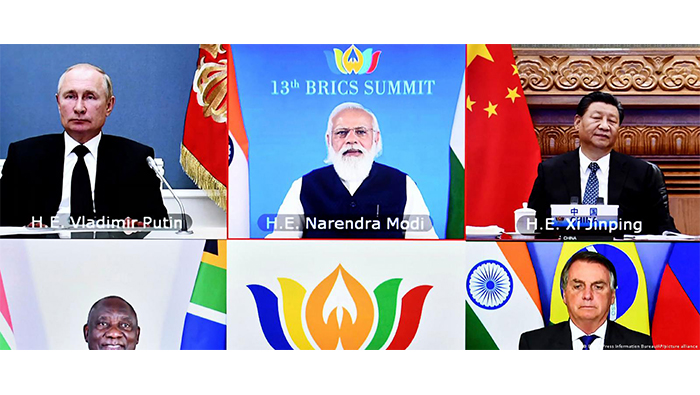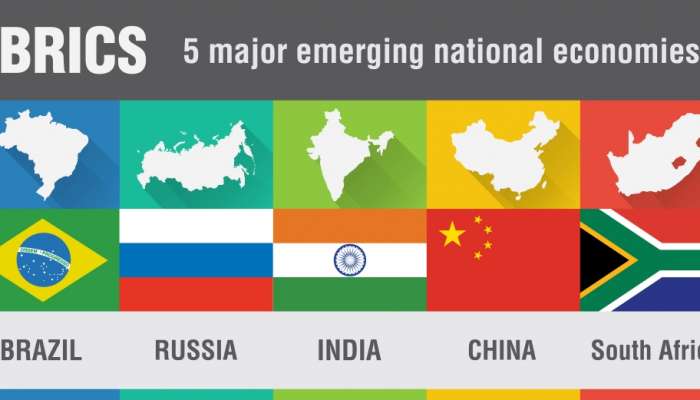

Beijing: Bangladeshi newspaper Dhaka Tribune has reported that Bangladesh has formally applied to join BRICS, an acronym of five major emerging economies -- Brazil, Russia, India, China and South Africa, once again drawing wide attention to the expansion of its membership.
After over a decade of development, BRICS cooperation has been greatly strengthened. The international community has widely recognized and supported BRICS, and an increasing number of like-minded countries want to join it.
Who Wants In?
According to Russian media reports, Russian Deputy Foreign Minister Sergei Ryabkov said on June 15 that the number of countries applying to join the BRICS bloc is increasing, reaching nearly 20.
Bangladeshi Prime Minister Sheikh Hasina and South African President Cyril Ramaphosa met in Geneva on June 14, after which Bangladesh applied to join BRICS. Russian Ambassador to Egypt Georgy Borisenko confirmed in an interview with Russian news agency TASS that Cairo has submitted its application to join BRICS, given its interest in "de-dollarization."
According to Japan's Mainichi Shimbun, Iran and Argentina have recently applied. In addition, Saudi Arabia, the United Arab Emirates, Nigeria and other oil-producing countries have also applied. Once these countries' applications are approved, the BRICS members will cover more than half of the world's oil and gas resources.
At the end of May this year, Venezuelan President Nicolas Maduro told reporters after talks with Brazilian President Luiz Inacio Lula da Silva that BRICS countries are attracting people who seek peace and cooperation.
Constructive Force
As an important platform for cooperation among emerging markets and developing countries, BRICS is committed to upholding multilateralism, reforming the global governance system, and increasing the representation and voice of emerging markets and developing countries. The block has become a positive, stable and constructive force in international affairs.
Spanish website Rebelion said many countries are tired of the United States' virtual domination of the global economy for decades, forcing dollar transactions. Failure to comply with Washington's directives will result in sanctions, economic and financial blackmail. In contrast, BRICS prioritizes assisting countries in advancing their investment and trade without imposing any preconditions.
"Above all, BRICS defends multipolarity and multilateralism ... By defending multilateralism, BRICS countries are countering the concept of the Cold War and opening up the possibility of a more equitable and just international economic order that benefits the world," Cuban President Miguel Diaz -Canel said recently.
The primary mission of BRICS countries is to serve as advocates for the interests of developing nations, said Valeriia Gorbacheva, head of the Multilateral Strategic Project Office at the Higher School of Economics of Russia's National Research University.
The goals and values of BRICS countries are consistent with those of most countries in the world, which means that the expansion of BRICS is only a matter of time, said Gorbacheva.
When to Expand
During the 14th BRICS Summit in June last year, the leaders of the five countries agreed to expand the bloc's membership.
South Africa holds the BRICS rotating presidency in 2023 and will host the 15th summit. Kremlin spokesman Dmitry Peskov said in an interview with Russian media that the topic of BRICS membership expansion would be included in the summit's agenda in August.
"We stand ready to bring more like-minded partners into the big family of BRICS," said Chinese Foreign Ministry Spokesperson Mao Ning, pointing out that BRICS is committed to upholding multilateralism and vigorously advancing global governance reforms.
Peskov said Russia is pleased that more countries have shown strong interest in BRICS. Russian Foreign Minister Sergei Lavrov said that many countries are queueing to join BRICS and the Shanghai Cooperation Organization, which reflects their increasingly important role.
In an interview with the TASS news agency, Nozipho Mxakato-Diseko, South Africa's permanent representative to the United Nations in Geneva, said BRICS is happy to accept new members who express interest in joining.